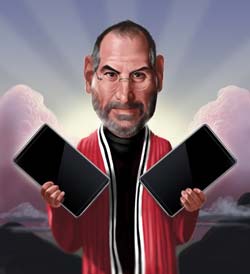 自史蒂夫•乔布斯去年10月份去世后,多数评论家形容他是一个苛求、强势和专一的管理者,他知道自己想要什么,并能最终得到。然而,当乔布斯遗孀劳伦上个月出现在国情咨文演讲的旁听席上时,不难发现,相比较之下,乔布斯在白宫最有力的挑战者巴拉克•奥巴马和米特•罗姆尼处于相当的弱势。甚至连同盟战友也抱怨他们太顺从和意志不坚定了。
自史蒂夫•乔布斯去年10月份去世后,多数评论家形容他是一个苛求、强势和专一的管理者,他知道自己想要什么,并能最终得到。然而,当乔布斯遗孀劳伦上个月出现在国情咨文演讲的旁听席上时,不难发现,相比较之下,乔布斯在白宫最有力的挑战者巴拉克•奥巴马和米特•罗姆尼处于相当的弱势。甚至连同盟战友也抱怨他们太顺从和意志不坚定了。
为什么这么说?问问我在旅行中遇到的经理们,为什么我们不能有更多史蒂夫•乔布斯这样有梦想、专断独裁的老板呢?他们说,这样的老板可以干掉通用、邮政系统和白宫。
这个问题本身就有问题。一个真正专一的巨人不可能在一个庞大组织的最高职位上有效率。我研究、接触和培训过的最有天赋的高管们,他们多数更像罗姆尼和奥巴马这样,而不是像乔布斯那样。所谓的“弱势”老板——顺从、协作、谦虚、友好、恭敬——却统领着现在的整个世界。为什么?因为他们做了更多的事。
事实证明,没有任何老板,无论弱势与强势,协作与否,都没有我们所期望的对公司命运绝对的掌控权。特别是对那些庞大复杂的机构而言——例如,埃克-森美孚,通用汽车和美国政府——通过自己漫长的职业生涯径自走向成功,根本就没有这么全能的强大领导者。
如果你想成功,这样做会更容易实现:雇用出色的助理,倾听他们的意见并给出最好的建议,然后把权力交给他们,让他们为各部门和团队的利益作出最明智的决定。
行政总裁这个职位的重要性在近几年渐渐淡化,大公司的民主化进程是其中一部分原因。自2003年以来,纽约证券交易所和纳斯达克上市的公司已经明令禁止在董事会里安排内部人员。机构股东们更倾向于行动派了,中层管理者普遍是MBA学历,并期望通过参与关键性的决策制定来体现他们的价值。
多数情况,中层管理者也有专业技能,而且相较于行政总裁,他们更靠近问题所在(因此,他们可以直击问题根源)。再加上,现代商业中的监管、绩效评估和当面批评正日益增多。简单地说,如今老板们不再有特权,对反对者的声音不管不顾的时代已经过去了。
吉姆•斯金纳就是“弱势”老板中的一个。你不知道他?没关系,他的维基百科条目也只有四段长而已,尽管他是全球170万名员工的老板。(这个数目是Facebook员工数目的500倍。)斯金纳是麦当劳的行政总裁。
斯金纳不是雷•克拉克,他没有大张旗鼓地扩张麦当劳的商店数目或全新打造菜单。曾当过海军的他大学还没毕业,在中层领导岗位默默工作,并且一干就是几十年,可以称得上是业务专家了。他是一个恭敬且略带害羞的人,后被同事公认为是聪明能干的好帮手。
就这样一直到2004年,麦当劳接连两位总裁在6个月的时间内相继罹患癌症,斯金纳在恐惧中被推向最高领导职位。观察家们纷纷猜测——那时斯金纳已经60岁了——他只是在短期内临时担任总裁职位。
When Steve Jobs died last October, most commentators portrayed him as a demanding, forceful, single-minded micromanager who knew what he wanted and got it. Then when Jobs’ widow, Laurene, appeared in the gallery at the State of the Union Address last month, it was hard not to be reminded of how weak Barack Obama and Mitt Romney, his most likely challenger for the White House, seem by comparison. Even their allies complain that these men are too pliant, too prone to pandering.
Why, ask the managers I meet in my travels, can’t we have more bosses like visionary, dictatorial Steve Jobs? A strong boss like that could straighten out General Motors, they say. Or the postal system. Or the White House.
Wrong question. A truly single-minded titan can’t be effective at the helm of a big organization. The most talented executives I’ve studied, met and taught resemble Romney or Obama more than they do Jobs. “Weak” bosses—pliant, collaborative, humble, nice, deferential—are taking over the world. Why? They get more done.
It turns out that no boss, whether weak or strong, collaborative or not, really has the absolute power we expect him or her to have over the organization and its destiny. Especially for large and complex outfits—such as ExxonMobil, General Motors or the U.S. government itself—there simply is no such thing as an all-powerful “strong” leader who muscles his or her way to success over a long career.
If success is your goal, you’ll fare far better if you hire fabulous lieutenants, listen to them and offer your best advice, then empower them to make meaningful decisions for the good of their divisions and their teams.
The chief executive title has conveyed less heft in recent years, due in part to the democratization of big business. Since 2003, companies listed on the NYSE and NASDAQ have been barred from stacking their boards with insiders. Institutional shareholders have been more inclined to activism. Middle managers are more likely to hold an MBA and to expect their input on key decisions to count for something.
In most cases, middle managers also have specialized skills and are closer to the problem (where they can use their insights to attack the root causes) than is the chief executive. Add to that the increased scrutiny, frequent performance assessments, and vocal criticism that’s expected in the modern business world. Simply said, bosses don’t have the luxury of either insulating themselves or ignoring their critics these days.
Jim Skinner is one of those “weak” bosses. Don’t know him? You’re not alone. His Wikipedia entry is just four paragraphs long, even though he’s boss to 1.7 million people around the globe. (That’s 500 times as many as Facebook employs.) Skinner is chief executive of McDonald’s.
Skinner is no Ray Kroc. He hasn’t significantly expanded the McDonald’s store count or reinvented its menu. A former Navy man who didn’t graduate from college, Skinner was an operations specialist who toiled anonymously for decades in middle management. Deferential and shy, he was apparently regarded by his colleagues late in his career as a sensible, convenient lieutenant.
Then in 2004, two successive McDonald’s chiefs were tragically struck by cancer within six months of each other, and Skinner was hurriedly installed at the helm. Observers assumed—Skinner was 60 at the time—that he would be a short-term caretaker chief.
 自史蒂夫•乔布斯去年10月份去世后,多数评论家形容他是一个苛求、强势和专一的管理者,他知道自己想要什么,并能最终得到。然而,当乔布斯遗孀劳伦上个月出现在国情咨文演讲的旁听席上时,不难发现,相比较之下,乔布斯在白宫最有力的挑战者巴拉克•奥巴马和米特•罗姆尼处于相当的弱势。甚至连同盟战友也抱怨他们太顺从和意志不坚定了。
自史蒂夫•乔布斯去年10月份去世后,多数评论家形容他是一个苛求、强势和专一的管理者,他知道自己想要什么,并能最终得到。然而,当乔布斯遗孀劳伦上个月出现在国情咨文演讲的旁听席上时,不难发现,相比较之下,乔布斯在白宫最有力的挑战者巴拉克•奥巴马和米特•罗姆尼处于相当的弱势。甚至连同盟战友也抱怨他们太顺从和意志不坚定了。
